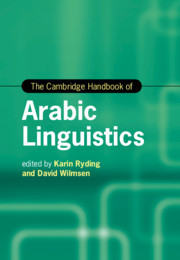The Cambridge Handbook of Arabic Linguistics Cambridge Handbooks in Language and Linguistics Series
Langue : Anglais
Coordonnateurs : Ryding Karin, Wilmsen David

Arabic linguistics encompasses a range of language forms and functions from formal to informal, classical to contemporary, written to spoken, all of which have vastly different research traditions. Recently however, the increasing prominence of new methodologies such as corpus linguistics and sociolinguistics have allowed Arabic linguistics to be studied from multiple perspectives, revealing key discoveries about the nature of Arabic-in-use and deeper knowledge of traditional fields of study. With contributions from internationally renowned experts on the language, this handbook provides a state-of-the-art overview of both traditional and modern topics in Arabic linguistics. Chapters are divided into six thematic areas: applied Arabic linguistics, variation and sociolinguistics, theoretical studies, computational and corpus linguistics, new media studies and Arabic linguistics in literature and translation. It is an essential resource for students and researchers wishing to explore the exciting and rapidly moving field of Arabic linguistics.
Introduction and Chapter Summaries Karin Ryding and David Wilmsen; Part I. Arabic Applied Linguistics: 1. Arabic Applied Linguistics Mohammad Alhawary; 2. Language Planning in the Arab World Hussein Elkhafaifi; 3. The Study of Arabic Language Acquisition Karen Froud and Reem Khamis-Dakwar; 4. Issues in Arabic Language Testing and Assessment Michael Raish; 5. Arabic Study Abroad: Critical Contextualization and Research-based Interventions Emma Trentman; 6. Models of Arabic Pronunciation Kassem Wahba; Part II. Arabic Variation and Sociolinguistics: 7. Diglossia, Variation, and Structural Complexity Samira Farwaneh; 8. Sociolinguistic Variation and Variation in Sociolinguistics Uri Horesh; 9. What is Formal Spoken Arabic? Gunvor Mejdell; 10. Arabic Dialectology Stephan Procházka; 11. Maltese: A Peripheral Dialect in the Historical Dialectology of Arabic David Wilmsen; Part III. Theoretical and Descriptive Studies: 12. Grammaticalization in Arabic Mohssen Esseesy; 13. Arabic and Onomastics Terrence Potter; 14. The Intonation of Arabic Khaled Rifaat; 15. Case in Arabic Karin Ryding; 16. On Arabic Morphosyntax within the Theory of Generative Grammar Usama Soltan; 17. Arabic Morphology: Inflectional and Derivational Janet Watson; Part IV. Arabic Computational and Corpus Linguistics: 18. Arabic Computational Linguistics Nizar Habash; 19. Arabic Corpus Linguistics and Related Tools: An Overview and Some Critical Observations Mark Van Mol; 20. The Utility of Arabic Corpus Linguistics Mai Zaki, David Wilmsen and Dana Abdulrahim; Part V. Arabic Linguistics and New Media Studies: 21. Language Policy and the Arabic Localization of Twitter Amy Johnson; 22. Variation and Social Change on Syrian Dissidents' Social Media Francesco Sinatora; Part VI. Arabic Linguistics in Literature and Translation: 23. Vernacular Varieties in Recent Arabic Literature Eva Håland; 24. Stylistics and Translation: A Corpus-based Case Study of English-Arabic Demonstratives Mai Zaki.
Karin Christina Ryding is Professor Emerita of Arabic linguistics in the Department of Arabic and Islamic Studies at Georgetown University. In 2008, she was granted the Lifetime Achievement Award by the American Association of Teachers of Arabic, and the Distinguished Service Award from the Georgetown Faculty of Languages and Linguistics. Recent publications include Arabic: A Linguistic Introduction (Cambridge 2014).
David Wilmsen is Professor and Head of the Department of Arabic and Translation Studies at the American University of Sharjah. He has lived thirty years in the Arabophone world, studying the local dialects of the regions in which he has lived, publishing numerous studies in Arabic dialectology, and teaching in and administering translation and Arabic-as-foreign-language study-abroad programs.
David Wilmsen is Professor and Head of the Department of Arabic and Translation Studies at the American University of Sharjah. He has lived thirty years in the Arabophone world, studying the local dialects of the regions in which he has lived, publishing numerous studies in Arabic dialectology, and teaching in and administering translation and Arabic-as-foreign-language study-abroad programs.
Date de parution : 09-2021
Ouvrage de 650 p.
17.7x25.1 cm
Thème de The Cambridge Handbook of Arabic Linguistics :
© 2024 LAVOISIER S.A.S.



